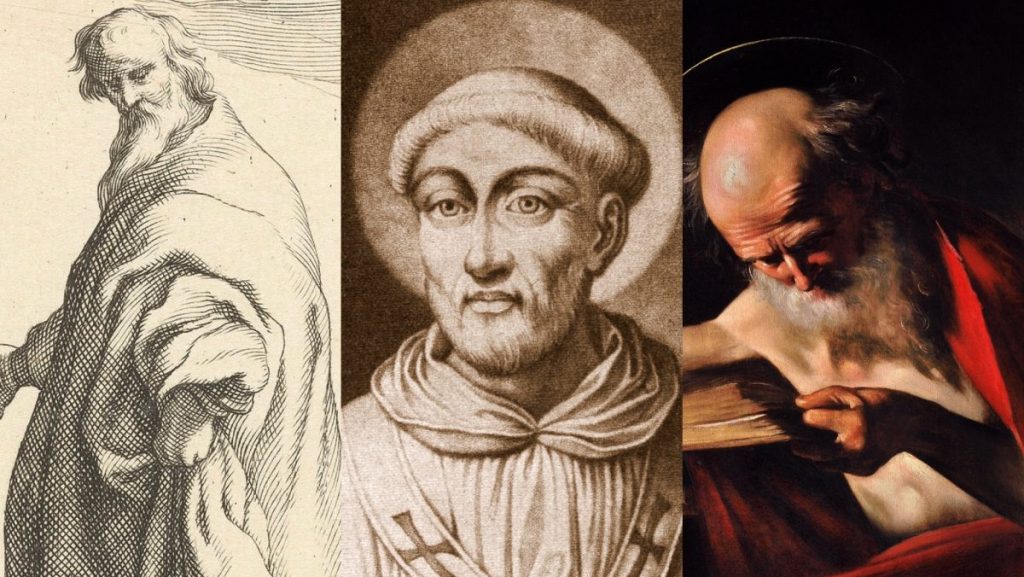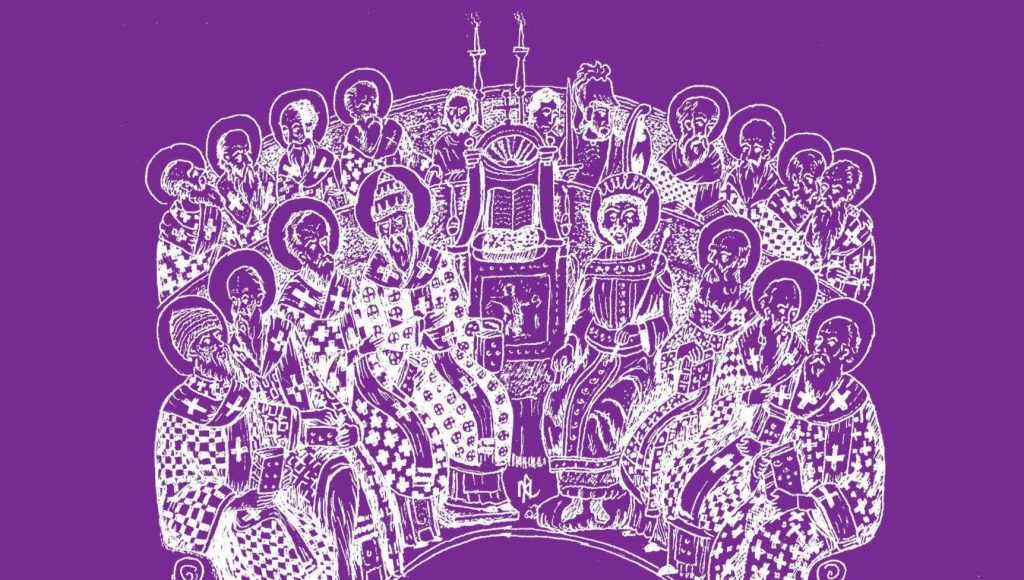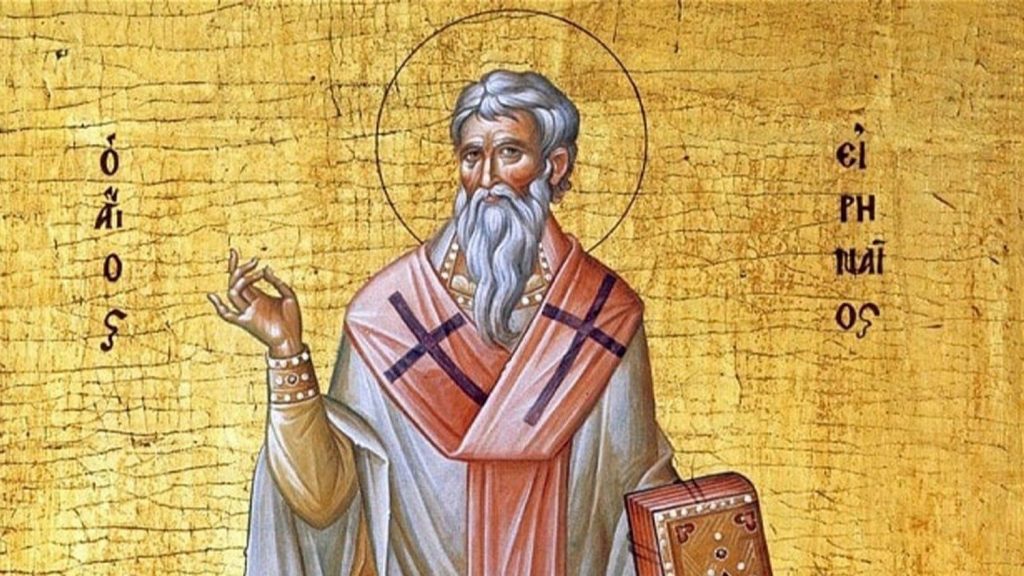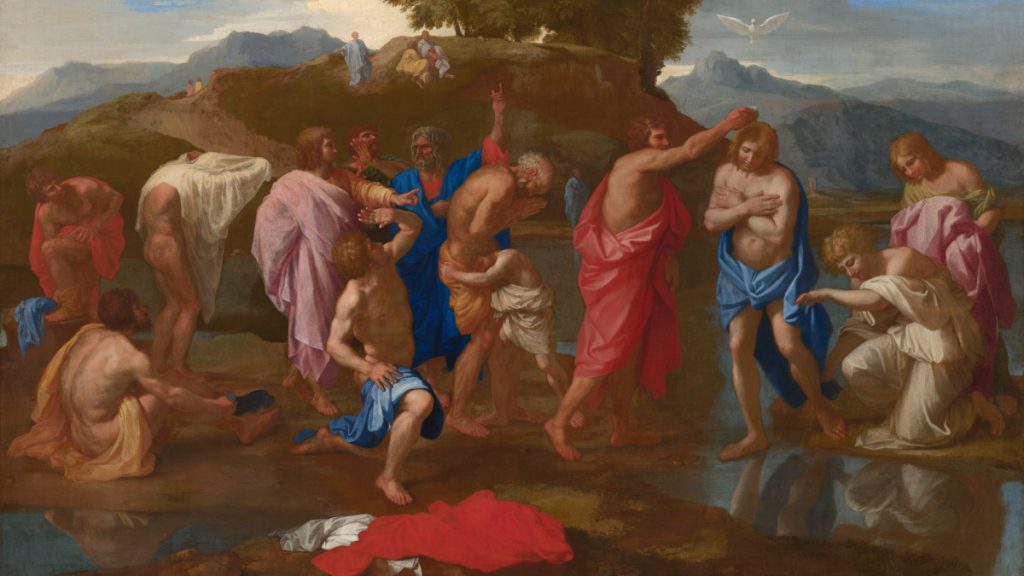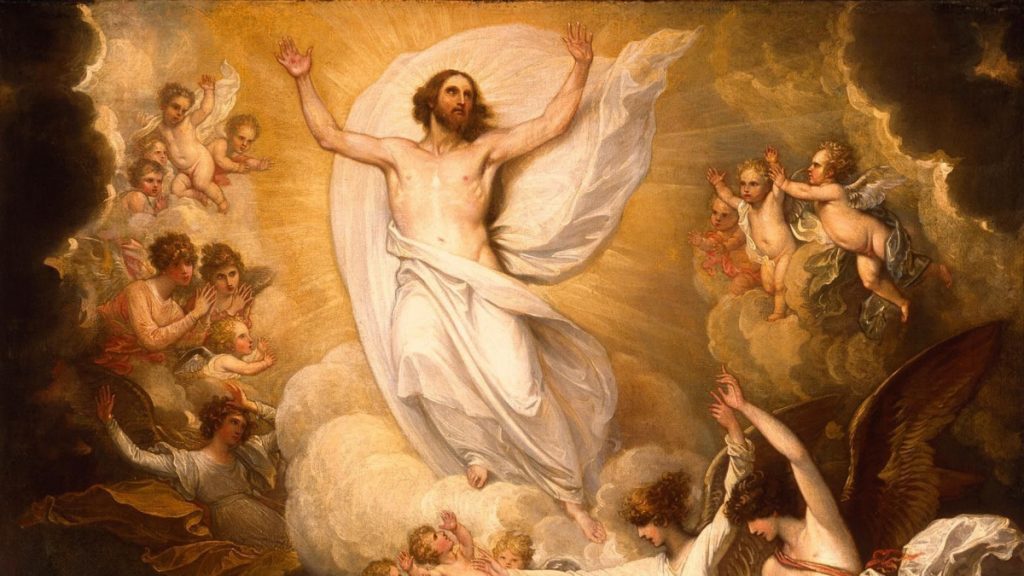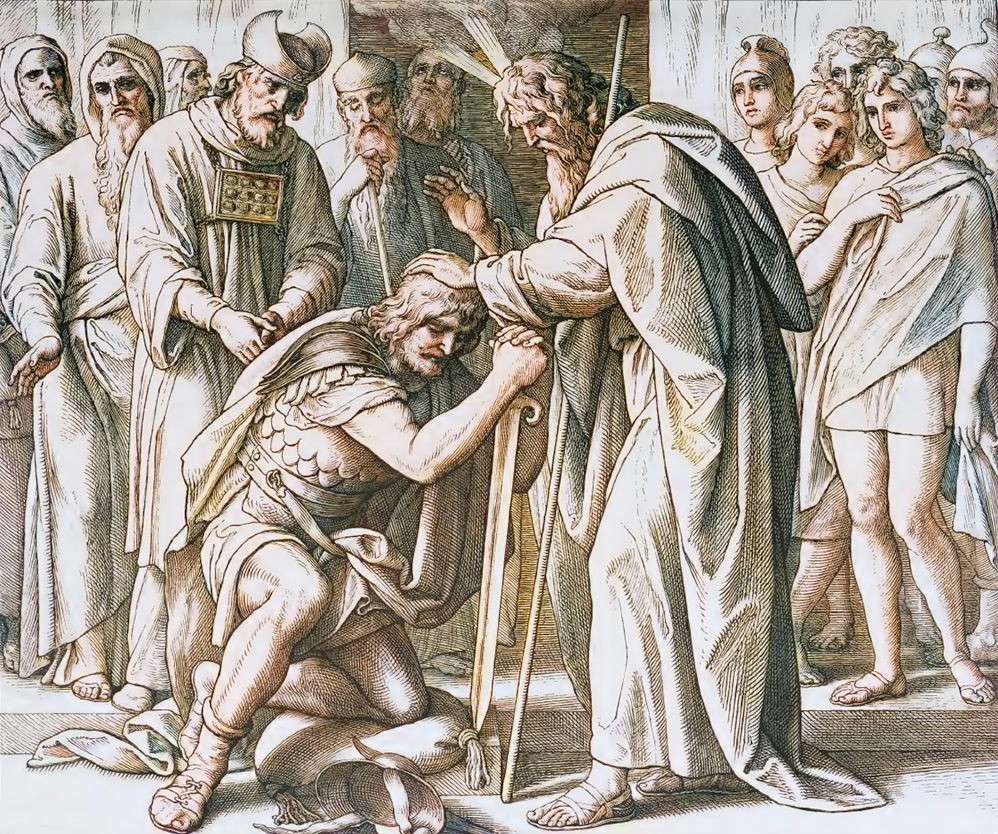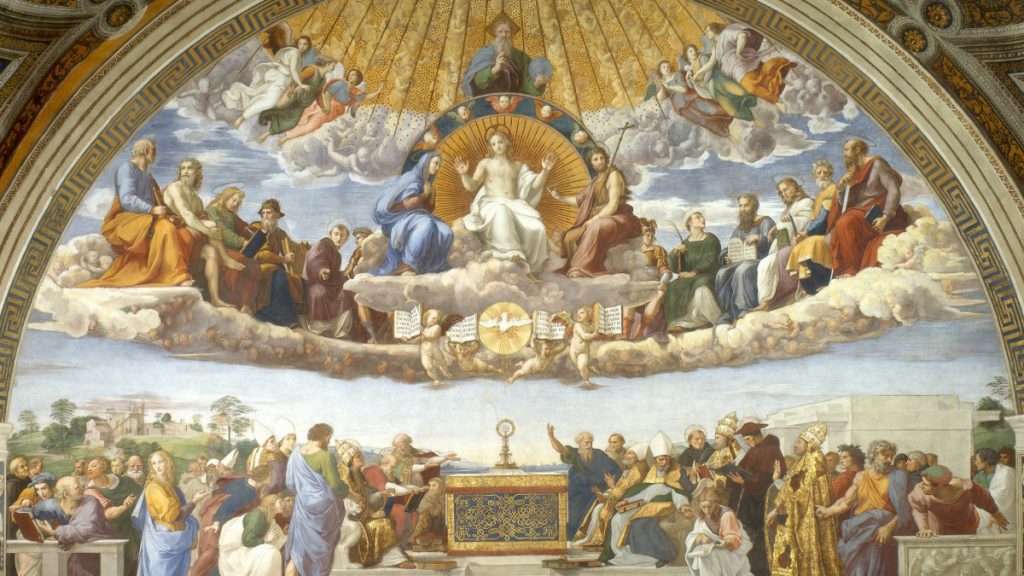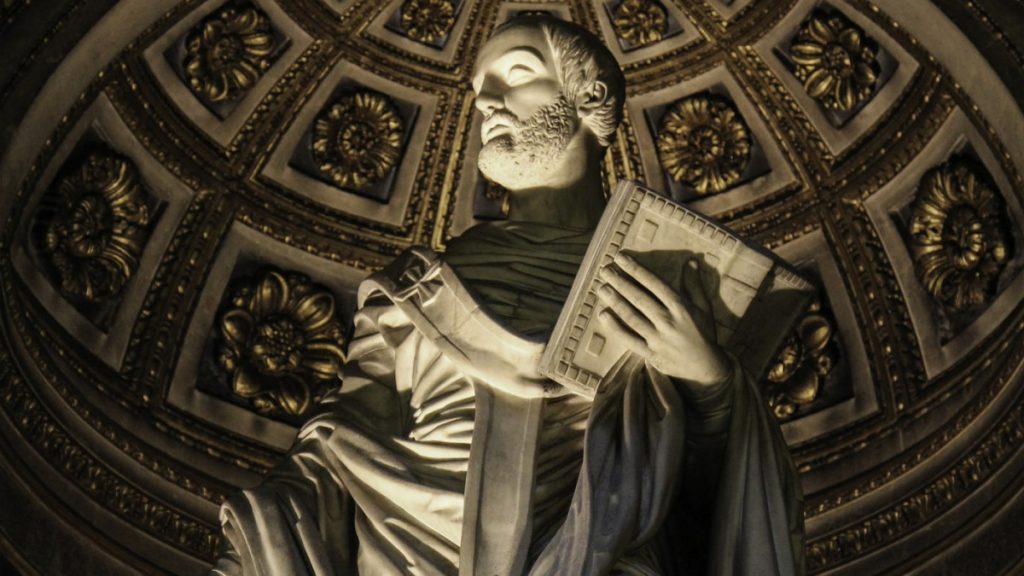(Updated July 16, 2025)
St. Augustine (354-430) | WEST
Relics of the Martyrs Cause a Blind Man to Receive His Sight in Milan
St. Augustine, City of God (Book 22, Ch. 8)
The miracle which was worked at Milan when I was there, and by which a blind man was restored to sight, could come to the knowledge of many; for not only is the city a large one, but also the emperor was there at the time, and the occurrence was witnessed by an immense concourse of people that had gathered to the bodies of the martyrs Protasius and Gervasius, which had long laid concealed and unknown, but were now made known to the bishop Ambrose in a dream, and discovered by him. By virtue of these remains the darkness of that blind man was scattered, and he saw the light of day.
St. Augustine, Confessions (Book 9, Ch. 7, §16)
Then did You [God] by a vision make known to your renowned bishop [St. Ambrose of Milan] the spot where lay the bodies of Gervasius and Protasius, the martyrs (whom You had in Your secret storehouse preserved uncorrupted for so many years), from which You might at the fitting time produce them to repress the feminine but royal fury [referring to the heretic Justina, the mother of the boy emperor Valentinian, who had persecuted St. Ambrose]. For when they were revealed and dug up and with due honor transferred to the Ambrosian Basilica, not only they who were troubled with unclean spirits (the devils confessing themselves) were healed, but a certain man also, who had been blind many years, a well-known citizen of that city, having asked and been told the reason of the people’s tumultuous joy, rushed forth, asking his guide to lead him there. Arrived there, he begged to be permitted to touch with his handkerchief the bier of Your saints, whose death is precious in Your sight [Ps. 116:15]. When he had done this, and put it to his eyes, they were immediately opened. From there did the fame spread; from there did Thy praises burn—shine; from there was the mind of that enemy [Justina, an empress who mistreated Ambrose], though not yet enlarged to the wholeness of believing, restrained from the fury of persecuting.
St. Augustine, Sermon 286 (§4) (428)1
So today, brothers and sisters, we are celebrating the memorial set up in this place in honor of Saints Protasius and Gervasius, the martyrs of Milan. Not the day when it was set up here, but the day we are celebrating today is the day of the discovery of the death of his saints, precious in the sight of the Lord [Ps. 116:15], by bishop Ambrose, that man of God. Of that glorious occasion for the martyrs I was myself also a witness. I was in Milan, I know about the miracles that occurred, when God bore witness to the precious deaths of his saints, so that by means of those miracles that death might be precious not only in the sight of the Lord, but also in the sight of men.
A blind man, well known to the whole city, had his sight restored; he ran, he had himself led to the spot, he went home without a guide. I haven’t heard that he died; perhaps he’s still alive. He vowed that he was going to serve all the rest of his life in that basilica of theirs, where their bodies are. We all rejoiced at his being able to see, we left him there at his service.
The Curing of Innocentius’s Fistula
St. Augustine, City of God (Book 22, Ch. 8)
But who but a very small number are aware of the cure which was worked upon Innocentius, ex-advocate of the deputy prefecture, a cure worked at Carthage, in my presence, and under my own eyes?
For when I and my brother Alypius [one of St. Augustine’s best friends], who were not yet clergymen, though already servants of God, came from abroad, this man received us, and made us live with him, for he and all his household were devotedly pious. He was being treated by medical men for fistula, of which he had a large number intricately seated in the rectum. He had already undergone an operation, and the surgeons were using every means at their command for his relief. In that operation he had suffered long-continued and acute pain; yet, among the many folds of the gut, one had escaped the operators so entirely that, though they ought to have laid it open with the knife, they never touched it. And thus, though all those that had been opened were cured, this one remained as it was, and frustrated all their labor.
The patient, having his suspicions awakened by the delay thus occasioned, and fearing greatly a second operation, which another medical man—one of his own domestics—had told him he must undergo, though this man had not even been allowed to witness the first operation, and had been banished from the house, and with difficulty allowed to come back to his enraged master’s presence—the patient, I say, broke out to the surgeons, saying, “Are you going to cut me again? Are you, after all, to fulfill the prediction of that man whom you would not allow even to be present?” The surgeons laughed at the unskillful doctor, and soothed their patient’s fears with fair words and promises.
So several days passed, and yet nothing they tried did him good. Still they persisted in promising that they would cure that fistula by drugs, without the knife. They called in also another old practitioner of great repute in that department, Ammonius (for he was still alive at that time); and he, after examining the part, promised the same result as themselves from their care and skill. On this great authority, the patient became confident, and, as if already well, vented his good spirits in facetious remarks at the expense of his domestic physician, who had predicted a second operation.
To make a long story short, after a number of days had thus uselessly elapsed, the surgeons, wearied and confused, had at last to confess that he could only be cured by the knife. Agitated with excessive fear, he was terrified, and grew pale with dread; and when he collected himself and was able to speak, he ordered them to go away and never to return.
Worn out with weeping, and driven by necessity, it occurred to him to call in an Alexandrian, who was at that time esteemed a wonderfully skillful operator, that he might perform the operation his rage would not suffer them to do. But when he had come and examined with a professional eye the traces of their careful work, he acted the part of a good man, and persuaded his patient to allow those same hands the satisfaction of finishing his cure which had begun it with a skill that excited his admiration, adding that there was no doubt his only hope of a cure was by an operation, but that it was thoroughly inconsistent with his nature to win the credit of the cure by doing the little that remained to be done, and rob of their reward men whose consummate skill, care, and diligence he could not but admire when he saw the traces of their work.
They were therefore again received to favor; and it was agreed that, in the presence of the Alexandrian, they should operate on the fistula, which, by the consent of all, could now only be cured by the knife. The operation was deferred till the following day. But when they had left, there arose in the house such a wailing, in sympathy with the excessive despondency of the master, that it seemed to us like the mourning at a funeral, and we could scarcely repress it.
Holy men were in the habit of visiting him daily: Saturninus of blessed memory, at that time bishop of Uzali, and the presbyter [priest] Gelosus, and the deacons of the church of Carthage; and among these was the bishop Aurelius, who alone of them all survives—a man to be named by us with due reverence—and with him I have often spoken of this affair, as we conversed together about the wonderful works of God, and I have found that he distinctly remembers what I am now relating.
When these persons visited him that evening according to their custom, he begged them, with pitiable tears, that they would do him the honor of being present next day at what he judged his funeral rather than his suffering. For such was the terror his former pains had produced, that he made no doubt he would die in the hands of the surgeons. They comforted him, and exhorted him to put his trust in God, and nerve his will like a man.
Then we went to prayer. But while we, in the usual way, were kneeling and bending to the ground, he cast himself down, as if someone were hurling him violently to the earth, and began to pray; but in what a manner, with what earnestness and emotion, with what a flood of tears, with what groans and sobs, that shook his whole body, and almost prevented him speaking, who can describe! Whether the others prayed, and had not their attention wholly diverted by this conduct, I do not know. For myself, I could not pray at all. This only I briefly said in my heart: “O Lord, what prayers of Your people do You hear if You hear not these?” For it seemed to me that nothing could be added to this prayer, unless he expired in praying. We rose from our knees, and, receiving the blessing of the bishop, departed, the patient beseeching his visitors to be present next morning, they exhorting him to keep up his heart.
The dreaded day dawned. The servants of God were present, as they had promised to be. The surgeons arrived. All that the circumstances required were ready. The frightful instruments are produced. All look on in wonder and suspense. While those who have most influence with the patient are cheering his fainting spirit, his limbs are arranged on the couch so as to suit the hand of the operator. The knots of the bandages are untied. The part is bared. The surgeon examines it, and, with knife in hand, eagerly looks for the sinus that is to be cut. He searches for it with his eyes, he feels for it with his finger, he applies every kind of scrutiny: he finds a perfectly firm cicatrix [scar of a healed wound]! No words of mine can describe the joy, and praise, and thanksgiving to the merciful and almighty God which was poured from the lips of all, with tears of gladness. Let the scene be imagined rather than described!
Innocentia of Carthage Healed of Breast Cancer
St. Augustine, City of God (Book 22, Ch. 8)
In the same city of Carthage lived Innocentia, a very devout woman of the highest rank in the state. She had cancer in one of her breasts, a disease which, as physicians say, is incurable. Ordinarily, therefore, they either amputate, and so separate from the body the member on which the disease has seized, or, that the patient’s life may be prolonged a little, though death is inevitable even if somewhat delayed, they abandon all remedies, following, as they say, the advice of Hippocrates. This is what the lady we speak of had been advised by a skillful physician, who was intimate with her family; and she betook herself to God alone by prayer.
On the approach of Easter, she was instructed in a dream to wait for the first woman that came out from the baptistery after being baptized, and to ask her to make the sign of Christ upon her sore. She did so, and was immediately cured.
The physician who had advised her to apply no remedy if she wished to live a little longer, when he had examined her after this, and found that she who, on his former examination, was afflicted with that disease was now perfectly cured, eagerly asked her what remedy she had used, anxious, as we may well believe, to discover the drug which should defeat the decision of Hippocrates. But when she told him what had happened, he is said to have replied, with religious politeness, though with a contemptuous tone, and an expression which made her fear he would utter some blasphemy against Christ: “I thought you would make some great discovery to me.”
She, shuddering at his indifference, quickly replied: “What great thing was it for Christ to heal a cancer, who raised one who had been four days dead?”
When, therefore, I had heard this, I was extremely indignant that so great a miracle worked in that well-known city, and on a person who was certainly not obscure, should not be divulged, and I considered that she should be spoken to, if not reprimanded on this score. And when she replied to me that she had not kept silence on the subject, I asked the women with whom she was best acquainted whether they had ever heard of this before. They told me they knew nothing of it. “See,” I said, “what your not keeping silence amounts to, since not even those who are so familiar with you know of it.”
And as I had only briefly heard the story, I made her tell how the whole thing happened, from beginning to end, while the other women listened in great astonishment, and glorified God.
A Man Healed of Gout by Baptism
St. Augustine, City of God (Book 22, Ch. 8)
A gouty doctor of the same city, when he had given in his name for baptism, and had been prohibited the day before his baptism from being baptized that year by black woolly-haired boys who appeared to him in his dreams, and whom he understood to be devils, and when, though they trod on his feet, and inflicted the acutest pain he had ever yet experienced, he refused to obey them, but overcame them, and would not defer being washed in the laver of regeneration, was relieved in the very act of baptism, not only of the extraordinary pain he was tortured with, but also of the disease itself, so that, though he lived a long time afterwards, he never suffered from gout. And yet who knows of this miracle? We, however, do know it, and so, too, do the small number of brethren who were in the neighborhood, and to whose ears it might come.
A Man Cured of Paralysis and a Hernia by Baptism
St. Augustine, City of God (Book 22, Ch. 8)
An old comedian of Curubis [a town near Carthage] was cured at baptism not only of paralysis, but also of [a] hernia, and, being delivered from both afflictions, came up out of the font of regeneration as if he had had nothing wrong with his body. Who outside of Curubis knows of this, or who but a very few who might hear it elsewhere? But we, when we heard of it, made the man come to Carthage, by order of the holy bishop Aurelius, although we had already ascertained the fact on the information of persons whose word we could not doubt.
A Man’s Household Delivered of Demons by a Priest’s Prayers and the Mass
St. Augustine, City of God (Book 22, Ch. 8)
Hesperius, of a tribunitian family, and a neighbor of our own [near Hippo], has a farm called Zubedi in the Fussalian district; and, finding that his family, his cattle, and his servants were suffering from the malice of evil spirits, he asked our presbyters [priests], during my absence, that one of them would go with him and banish the spirits by his prayers. One went, offered there the sacrifice of the body of Christ, praying with all his might that that vexation might cease. It did cease forthwith, through God’s mercy.
Holy Earth from Jerusalem Heals a Paralytic
St. Augustine, City of God (Book 22, Ch. 8)
Now he [Hesperius, the man mentioned in the previous miracle story] had received from a friend of his own some holy earth brought from Jerusalem, where Christ, having been buried, rose again the third day. This earth he had hung up in his bedroom to preserve himself from harm. But when his house was purged of that demonic invasion, he began to consider what should be done with the earth, for his reverence for it made him unwilling to have it any longer in his bedroom.
It so happened that I and Maximinus, bishop of Synita, and then my colleague, were in the neighborhood. Hesperius asked us to visit him, and we did so. When he had related all the circumstances, he begged that the earth might be buried somewhere, and that the spot should be made a place of prayer where Christians might assemble for the worship of God. We made no objection: it was done as he desired.
There was in that neighborhood a young countryman who was paralytic, who, when he heard of this, begged his parents to take him without delay to that holy place. When he had been brought there, he prayed, and forthwith went away on his own feet perfectly cured.
A Man Exorcised of a Demon, Who Mutilated His Eye as He Left, Which Was Then Healed
St. Augustine, City of God (Book 22, Ch. 8)
There is a country-seat called Victoriana, less than thirty miles from Hippo-regius. At it there is a monument to the Milanese martyrs, Protasius and Gervasius. There a young man was carried, who, when he was watering his horse one summer day at noon in a pool of a river, had been taken possession of by a devil.
As he lay at the monument, near death, or even quite like a dead person, the lady of the manor, with her maids and religious attendants, entered the place for evening prayer and praise, as her custom was, and they began to sing hymns. At this sound the young man, as if electrified, was thoroughly aroused, and with frightful screaming seized the altar, and held it as if he did not dare or was not able to let it go, and as if he were fixed or tied to it; and the devil in him, with loud lamentation, begged that he might be spared, and confessed where and when and how he took possession of the youth.
At last, declaring that he would go out of him, he named one by one the parts of his body which he threatened to mutilate as he went out and with these words he departed from the man. But his eye, falling out on his cheek, hung by a slender vein as by a root, and the whole of the pupil which had been black became white.
When this was witnessed by those present (others too had now gathered to his cries, and had all joined in prayer for him), although they were delighted that he had recovered his sanity of mind, yet, on the other hand, they were grieved about his eye, and said he should seek medical advice. But his sister’s husband, who had brought him there, said, “God, who has banished the devil, is able to restore his eye at the prayers of His saints.” Therewith he replaced the eye that was fallen out and hanging, and bound it in its place with his handkerchief as well as he could, and advised him not to loose the bandage for seven days. When he did so, he found it quite healthy.
Others also were cured there, but of them it would be tedious to speak.
A Young Woman Exorcised of a Demon by Oil Mixed with the Tears of Her Priest
St. Augustine, City of God (Book 22, Ch. 8)
I know that a young woman of Hippo was immediately dispossessed of a devil, on anointing herself with oil, mixed with the tears of the presbyter [priest] who had been praying for her.
A Young Man Exorcised of a Demon by the Prayers of a Bishop
St. Augustine, City of God (Book 22, Ch. 8)
I know also that a bishop once prayed for a demoniac young man whom he never saw, and that he was cured on the spot.
Paschasius of Dumium (mid 500s) | WEST
The Eucharist, and an Ancient Bishop’s Vision of the State of Souls
Paschasius of Dumium, Questions and Answers of the Greek Fathers (Ch. 23, §1)2
One of the fathers told a story of a certain bishop to whom it had been reported that two men in his congregation were of very impure character and adulterers. He, accordingly, asked God to reveal to him whether this was so. As each one came forward for communion after the consecration of the host, he would study their faces and their souls. The faces of sinners he saw as black as coal and their eyes filled with blood; the others he saw with bright faces and clothed in white garments.
As they received the Body of the Lord, a light seemed to shine in the faces of some, but in others a flame. In order to learn about those who had been accused before him, he offered them communion, and he saw one of them with a bright honorable face, dressed in white garments, the other wearing black and with a terrible countenance. After they received the grace of the divine mystery, one seemed to be illumined with light, while the other was consumed with flame.
Therefore, the bishop asked God to instruct him in each matter that had been revealed. Whereupon an angel of the Lord stood by him and said: “All that you have heard about them is true, but one still clings to his depravity and his desire to sin and that is why you saw him with a black face and consumed with flame. The other also was similar to him, as you heard, but the reason why you saw his face illumined is that he recalled what he had done before and renounced his evil deeds and with tears and groans asked the mercy of God, promising that if his previous sins should be forgiven, he would never return to them. Therefore, his former sins are wiped out and he has achieved this grace which you have seen.”
As the bishop expressed wonder at the grace of God, that it not only set free of his torments a man of base life, but even honored him so greatly, the angel replied: “Well may you marvel, for you are a man. Our Lord and yours is by nature good and kind to those who cease from their sins and repent at confession, for He not only remits their torments, but even makes them worthy of honor. ‘For God so loved men that he gave his only-begotten Son’ (John 3:16) for sinners and appointed Him to death on their behalf. If He, therefore, though they were His enemies, chose to die for them, how much more shall He pity them when they are His own [Rom. 5:8-9]? This you should know, that no sins of men overcome the goodness of God, if only through repentance each one destroys the sins which he has previously committed. For God is merciful and knows the weakness of the human race and the strength of their passions and the ability and malice of the devil, and when men fall into sin, He is indulgent as if to sons and awaits their conversion; upon the penitent, as if upon those who languish, He has compassion and mercy: He soon dissolves their sins and even allows them the rewards of the just.”
Hearing this, the bishop marveled greatly and glorified God, revealing to all what had happened.
St. Pope Gregory the Great (c. 540-604) | WEST
A Nun Expels a Demon from a Man into a Pig
St. Pope Gregory the Great, Dialogues (Book 3, §21)3
GREGORY: I am going to tell you a story for the truth of which the saintly old man Eleutherius, whom I mentioned above, will be my witness. There was a young woman in Spoleto filled with a strong desire to lead the religious life. She was of marriageable age, the daughter of a state official. In spite of her father’s attempts to stop her from entering this way of life, she took the religious habit. As a result she was disinherited, receiving as her sole share half of a small farm. Inspired by her example, many other young ladies of the upper class turned from a worldly life to serve almighty God with her in the holy state of virginity. One day, the saintly abbot Eleutherius came to instruct and encourage her. As they sat there speaking about the word of God, a tenant of the estate she had received as the portion of her inheritance came to her with a gift. Just as he presented himself to them, he fell to the ground and under the compulsion of an evil spirit began to writhe in pain and bleat noisily. The holy nun arose and with an angry look on her face exclaimed, “Leave this man, you wretch! Leave him, I say!” The Devil answered through the voice of the possessed man, “And if I leave him, into whom shall I enter?”
A small pig happened to be feeding nearby. So, when the 152 | 153 nun commanded him to enter into it, the evil spirit promptly left the man and entered the pig, killed it, and departed.
PETER: I would like to know whether she ought to have allowed even a pig to come under the control of the evil spirit.
GREGORY: The deeds of Christ, who is Truth itself, are the norms set up for our conduct. Was it not Him that the entire legion of devils in the possessed man directed their words? “If thou hast a mind to cast us out, they said, send us into the herd of swine” (Matt. 8:31). And Christ, after casting them out, allowed them to enter the swine and drive them over the precipice.
From this we know, too, that without God’s permission the evil spirit has no power against mankind, for he could not even have entered into the swine if God had not allowed it. We must therefore subject ourselves of our own free will to Him to whom all opposing forces must subject themselves even against their will. By doing so we become stronger than our enemies, for through our humility we become one with the Creator of the universe. Is it surprising, then, if God’s chosen followers, perform wonders during their lifetime? Even in death it is not uncommon for their bones to be alive with miraculous power.
A Thief Prevented by the Relics of a Holy Priest from Stealing a Sheep
St. Pope Gregory the Great, Dialogues (Book 3, §22)4
GREGORY: The following incident, related to me by Abbot Valentio of happy memory, occurred in Valeria. A pious priest of that province was leading a monastic life with his clergy, 153 | 154 intent on good works and the praises of God. The day of death overtook him and he was buried in front of the church. It so happened that the way to the sheepfold, which was nearby, led through the place of his burial.
One night while the clergy was in church reciting the Office, a thief came to the sheepfold and left quickly with a stolen sheep on his shoulders. When he was about to pass the grave of the saintly priest, he was suddenly rooted to the ground, unable to move a foot. Taking the sheep down from his shoulders, he wanted to set it free, but was unable to do so; his hands would not let go of the sheep. So he stood there bewildered, caught with the booty, unable to get rid of it or to run off with it. He who had feared detection by the living was now, miraculously, held fast by the dead. Bound as he was hand and foot, he remained on the spot unable to move.
In the morning, after the praises of God were ended, the clergy came out of the church and found this stranger holding the sheep. At first sight it was hard to tell whether he was taking the sheep or making an offering of it. But the culprit could not hide his guilt very long. Amazed that through the merits of the saintly man of God the thief should stand before them unable to get rid of the booty, they began at once to pray and only through fervent prayer were they able to obtain his release. After standing there all this time forced to hold on to the stolen sheep, the thief could finally take his departure, once again free and unburdened.
PETER: The graciousness of almighty God toward us becomes apparent in these delightful miracles.
A Holy Abbot’s Dead Body Moves Over to Allow Another Priest to be Buried With Him
St. Pope Gregory the Great, Dialogues (Book 3, §23)5
GREGORY: The monastery of St. Gregory, Peter, that home of saintly men, stands on a mountain overlooking the city of Palestrina. It is from there I got the next story I am going to tell. I was still living in my monastery when I first heard it and was assured by the monks that they had accurate knowledge of the facts.
By carefully supervising the spiritual development of one of his monks, a holy abbot of St. Peter’s had led him to a high degree of sanctity. Seeing that he had made remarkable progress in the fear of God, the abbot had him ordained priest for the monastery. Soon after his ordination, however, this priest was informed through a revelation that death would overtake him in a short time. Going immediately to his abbot, he asked leave to prepare a burial place for himself. The abbot granted his request, but added: “Be assured that I [am] going to die before you. However, prepare your grave as you requested.”
The priest did so. A few days later the abbot was overcome by a fever. As he was nearing death he turned to the priest standing at his side and said, “Lay my body to rest in your grave.”
The priest also took sick shortly after and died. His body was taken to the same place for burial. On opening the grave, everyone attending the funeral saw that it was 155 | 156 impossible to bury the priest in it because the abbot’s body, already buried there, took up all the space. Seeing this difficulty, one of the monks who was pallbearer exclaimed, “Father Abbot, what of your promise that the grave would hold both of you?”
At these words the body of the abbot, which lay stretched out before them just as it had been laid to rest, turned on its side, leaving room for the priest. Thus in the sight of all he fulfilled after death the promise he had made while still alive.
This miracle took place in the Monastery of St. Peter the Apostle.
St. Peter Appears in a Vision to Show that Veneration for Him Will Merit Eternal Reward
St. Pope Gregory the Great, Dialogues (Book 3, §§23-24)6
(§23) …GREGORY: If you do not mind, I should now like to tell you about the sacristans of the church in Palestrina where the holy abbot’s body lies buried.
PETER: Please do. It will be a pleasure to listen.
(§24) GREGORY: There are still some people in Palestrina who remember Theodore, the sacristan of their church. He is the one who told me of a remarkable personal experience he had in this church. One morning he got up very early to trim the lamps at the church door. While he was standing under the lamp on the wooden platform regularly used for this purpose, St. Peter the Apostle suddenly appeared to him, wearing a white garment. As he stood there on the floor below Theodore, he said, “Friend, why did you get up so early?” With this he vanished from sight. An overpowering fear lay hold 156 | 157 of Theodore, robbing him of all bodily strength and confining him to bed for many days, unable to rise.
With this vision, the blessed Apostle wished to assure his followers that he was watching over them constantly and would always see to it that what they did out of veneration for him would be repaid with an eternal reward.
PETER: To me the surprising thing is, not that St. Peter became visible, but that Theodore, who had been in perfect health, became sick at the sight of him.
GREGORY: Why are you surprised at this, Peter? Have you forgotten the words of the Prophet Daniel, who trembled at the sight of his mighty and terrifying vision? “I became weak,” he said, “and was sick for some days” (Dan. 8:27). The flesh is overwhelmed by the things of the spirit. Sometimes, therefore, when the mind is allowed to see beyond its human powers, the body cannot but grow weak, because the task imposed is more than it can endure.
PETER: Your clear explanation has removed the difficulty I had in understanding.
St. Peter Appears in a Vision to a Paralyzed Girl, Tells Her to go to Acontius the Sacristan for Healing
St. Pope Gregory the Great, Dialogues (Book 3, §25)7
Not so very long ago, as our elders tell us, there was a sacristan of this church [of Rome] named Acontius, a man of extraordinary humility and gravity. His fidelity in the service of almighty God was recognized by St. Peter the Apostle, who showed by a miracle how highly he esteemed him for it.
One of the girls in the parish was a paralytic. Since her lower limbs were completely paralyzed, she used to creep along, supported only by her hands, while her body dragged over the ground. For a long time she had been praying to St. Peter for a cure. Then, one night, he stood at her side and said, “Go to Acontius the sacristan. Speak to him and he will give you back your health.”
Putting full faith in this remarkable vision, she made her way to the church, dragging herself through different parts of it in the hope of finding Acontius. Just then he happened to come her way, and she, not knowing him, said, “Father, can you tell me where to find Acontius the sacristan?” “I am Acontius,” he replied. Eagerly she gave her message. “Our shepherd,” she said, “the feeder of our flock, St. Peter, the Apostle, sent me to you to be cured of this affliction.”
“If you have been sent by him,” Acontius answered, “then get up on your feet.” With this he took her by the hand and raised her to a standing position. From that moment all the nerves and muscles of her body were restored to health and all signs of paralysis disappeared completely.
If I should describe all the marvels that happened in this one church, I would not be able to tell of the miracles that took place in any other church.
Reparatus Has a Vision of Hell
St. Pope Gregory the Great, Dialogues (Book 4, §32)8
GREGORY: When I first experienced the desire to embrace monastic life, I was frequently in the company of an old 228 | 229 man, a friend of mine named Deusdedit. He was known for his uprightness and was on very friendly terms with the nobility of Rome. It is from him that I have the following story.
“In the time of the Goths,” he said, “a prominent man named Reparatus was nearing his death. After he had been lying silent and motionless for some time, it became evident that all breathing had ceased and that the body was a lifeless corpse. While the crowd that had gathered round the body was grieving with the members of his family over his death, Reparatus suddenly came back to life. The mourners’ sorrow turned into amazement. The first thing he said was, ‘Send a messenger to the Church of St. Lawrence the Martyr, which is called “The Damasus Church” after its builder, to see how things stand with the priest Tiburtius, and have him bring back a report at once.’
“Now, Tiburtius had the reputation of being a dissolute and sensual man, and as such he is also well remembered by Florentius, who is now the priest in charge of that church. After the messenger had set out, Reparatus described what he had heard and seen during his stay in the next world. ‘An immense pyre had been prepared,’ he said, ‘and the priest Tiburtius was brought in and placed on top of it. Fire was then set to the huge mass and the unfortunate priest perished in the flames. But there was a second pyre, whose summit seemed lost in the sky, and a loud voice was heard shouting, “Whose pyre is this?” Having said this, Reparatus died. The priest Tiburtius, too, was found dead when the messenger arrived.”
His journey to hell, his return and description of what he had seen, and his subsequent death, indicate that all this did not happen for Reparatus’ own benefit, but as a warning for us that we should use the opportunities gives us to correct our evil ways. And the pyre of wood which Reparatus saw 229 | 230 does not mean that wood is burned in hell. It was meant, rather, to give him a vivid picture of the fires of hell, so that, in describing them to the people, they might learn to fear the eternal fire through their experience with natural fire.”
Deacon Paschasius Dies, Appears to a Bishop, and Has His Soul Cleansed of the Sin of Ignorantly Rejecting the Rightful Pope
St. Pope Gregory the Great, Dialogues (Book 4, §42)9
When I was still a young layman, I heard my elders and men acquainted with the circumstances tell of Paschasius, a deacon of the Apostolic See. His highly orthodox and brilliantly written books on the Holy Spirit are still read. He was a man of outstanding sanctity and very zealous in the practice of almsgiving. His kindness to the poor was remarkable, while for himself he had nothing but contempt.
In the dispute over the papacy between the parties of Symmachus and Lawrence, which was accompanied by the excitement of popular demonstrations, he cast his vote for Lawrence. Even though Symmachus was later on accepted 249 | 250 unanimously by both parties, Paschasius would not change his affiliations, but to the end of his life reserved his devotion and respect for Lawrence, the man whom the Church by the judgment of her bishops had refused to set up as her head.
Paschasius died during the reign of Pope Symmachus. A possessed person touched his dalmatic [liturgical vestment], which had been laid on the coffin, and was instantly cured. A long time afterward, Germanus, Bishop of Capua, whom I have already mentioned [Book 2, §35; Book 4, §8], came to the baths of Angulus at his doctor’s advice. As he entered the hot baths, he found the deacon Paschasius standing there as an attendant. Germanus was shocked and asked what a man of his dignity was doing in such a place. “The only reason I am serving here,” the deacon answered, “is that I endorsed the party of Lawrence against Symmachus. But I beg you, pray for me to the Lord. When you come back and no longer find me here, you will know that your prayers have been heard.”
Germanus, therefore, gave himself to fervent prayer, and, when he returned a few days later, Paschasius no longer appeared. This purification from sin after death was possible because the deacon had sinned through ignorance, and not through malice. What we are to believe is that through his previous alms deeds he obtained the grace of receiving forgiveness at a time when he was no longer able to do meritorious works.
Footnotes
- St. Augustine, Edmund Hill, O.P., trans., John E. Rotelle, O.S.A., ed., The Works of Saint Augustine, Vol. 8: Sermons 273-305A (Hyde Park, NY: New City Press, 1994), 103. ↩︎
- Claude W. Barlow, trans., The Fathers of the Church, Vol. 62: Iberian Fathers, Volume 1, Martin of Braga, Paschasius of Dumium, Leander of Seville (Washington, DC: The Catholic University of America Press, 1969), 144-45. ↩︎
- St. Pope Gregory the Great, Odo John Zimmerman, trans., The Fathers of the Church, Vol. 39: St. Gregory the Great, Dialogues (Washington, DC: Catholic University of America Press, 2002), 152-53. ↩︎
- St. Pope Gregory the Great, Odo John Zimmerman, trans., The Fathers of the Church, Vol. 39: St. Gregory the Great, Dialogues (Washington, DC: Catholic University of America Press, 2002), 153-54. ↩︎
- St. Pope Gregory the Great, Odo John Zimmerman, trans., The Fathers of the Church, Vol. 39: St. Gregory the Great, Dialogues (Washington, DC: Catholic University of America Press, 2002), 155-56. ↩︎
- St. Pope Gregory the Great, Odo John Zimmerman, trans., The Fathers of the Church, Vol. 39: St. Gregory the Great, Dialogues (Washington, DC: Catholic University of America Press, 2002), 156-57. ↩︎
- St. Pope Gregory the Great, Odo John Zimmerman, trans., The Fathers of the Church, Vol. 39: St. Gregory the Great, Dialogues (Washington, DC: Catholic University of America Press, 2002), 158. ↩︎
- St. Pope Gregory the Great, Odo John Zimmerman, trans., The Fathers of the Church, Vol. 39: St. Gregory the Great, Dialogues (Washington, DC: Catholic University of America Press, 2002), 228-30. ↩︎
- St. Pope Gregory the Great, Odo John Zimmerman, trans., The Fathers of the Church, Vol. 39: St. Gregory the Great, Dialogues (Washington, DC: Catholic University of America Press, 2002), 249-50. ↩︎
